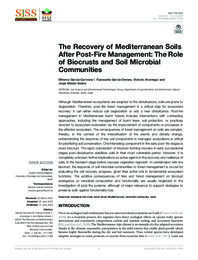Por favor, use este identificador para citar o enlazar este ítem:
https://hdl.handle.net/11000/33646Registro completo de metadatos
| Campo DC | Valor | Lengua/Idioma |
|---|---|---|
| dc.contributor.author | García-Carmona, Minerva | - |
| dc.contributor.author | Garcia-Orenes, Fuensanta | - |
| dc.contributor.author | ARCENEGUI, VICTORIA | - |
| dc.contributor.author | Mataix Solera, Jorge | - |
| dc.contributor.other | Departamentos de la UMH::Agroquímica y Medio Ambiente | es_ES |
| dc.date.accessioned | 2024-10-25T09:52:04Z | - |
| dc.date.available | 2024-10-25T09:52:04Z | - |
| dc.date.created | 2023-06-13 | - |
| dc.identifier.citation | Spanish Journal of Soil Science, Volume 13, June 2023 | es_ES |
| dc.identifier.issn | 2253-6574 | - |
| dc.identifier.uri | https://hdl.handle.net/11000/33646 | - |
| dc.description.abstract | Although Mediterranean ecosystems are adapted to fire disturbances, soils are prone to degradation. Therefore, post-fire forest management is a critical step for ecosystem recovery: it can either reduce soil degradation or add a new disturbance. Post-fire management in Mediterranean burnt forests includes interventions with contrasting approaches, including the management of burnt trees, soil protection, or practices devoted to ecosystem restoration via the improvement of components or processes in the affected ecosystem. The consequences of forest management on soils are complex, thereby, in the context of the intensification of fire events and climate change, understanding the response of key soil components in managed ecosystems is critical for prioritizing soil conservation. One interesting component in the early post-fire stages is moss biocrust. The rapid colonization of biocrust-forming mosses in early successional stages post-disturbance stabilizes soils in their most vulnerable period. However, it is completely unknown further implications as active agents in the recovery and resilience of soils, in the transient stage before vascular vegetation regrowth. In combination with the biocrust, the response of soil microbial communities to forest management is crucial for evaluating the soil recovery progress, given their active role in fundamental ecosystem functions. The additive consequences of fires and forest management on biocrust emergence or microbial composition and functionality are usually neglected in the investigation of post-fire systems, although of major relevance to support strategies to preserve soils against functionality loss | es_ES |
| dc.format | application/pdf | es_ES |
| dc.format.extent | 9 | es_ES |
| dc.language.iso | eng | es_ES |
| dc.publisher | Frontiers Media | es_ES |
| dc.rights | info:eu-repo/semantics/openAccess | es_ES |
| dc.rights | Attribution-NonCommercial-NoDerivatives 4.0 Internacional | * |
| dc.rights.uri | http://creativecommons.org/licenses/by-nc-nd/4.0/ | * |
| dc.subject | Biological soil crust | es_ES |
| dc.subject | Burnt wood | es_ES |
| dc.subject | Mediterranean | es_ES |
| dc.subject | Microbial community | es_ES |
| dc.subject | Moss | es_ES |
| dc.title | The Recovery of Mediterranean Soils After Post-Fire Management: The Role of Biocrusts and Soil Microbial Communities | es_ES |
| dc.type | info:eu-repo/semantics/article | es_ES |
| dc.relation.publisherversion | https://doi.org/10.3389/sjss.2023.11388 | es_ES |

Ver/Abrir:
The recovery of mediterranean soils after.pdf
1,37 MB
Adobe PDF
Compartir:
 La licencia se describe como: Atribución-NonComercial-NoDerivada 4.0 Internacional.
La licencia se describe como: Atribución-NonComercial-NoDerivada 4.0 Internacional.
.png)